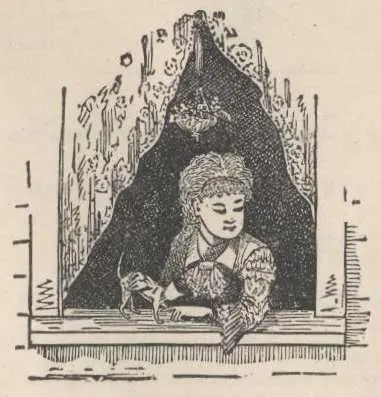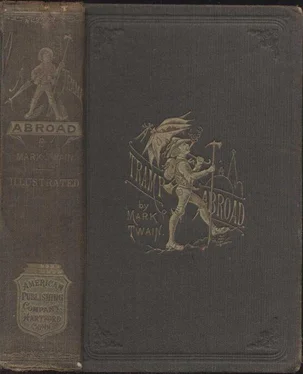Mark Twain - A Tramp Abroad
Здесь есть возможность читать онлайн «Mark Twain - A Tramp Abroad» весь текст электронной книги совершенно бесплатно (целиком полную версию без сокращений). В некоторых случаях можно слушать аудио, скачать через торрент в формате fb2 и присутствует краткое содержание. Жанр: Классическая проза, Юмористическая проза, на английском языке. Описание произведения, (предисловие) а так же отзывы посетителей доступны на портале библиотеки ЛибКат.
- Название:A Tramp Abroad
- Автор:
- Жанр:
- Год:неизвестен
- ISBN:нет данных
- Рейтинг книги:5 / 5. Голосов: 1
-
Избранное:Добавить в избранное
- Отзывы:
-
Ваша оценка:
- 100
- 1
- 2
- 3
- 4
- 5
A Tramp Abroad: краткое содержание, описание и аннотация
Предлагаем к чтению аннотацию, описание, краткое содержание или предисловие (зависит от того, что написал сам автор книги «A Tramp Abroad»). Если вы не нашли необходимую информацию о книге — напишите в комментариях, мы постараемся отыскать её.
A Tramp Abroad — читать онлайн бесплатно полную книгу (весь текст) целиком
Ниже представлен текст книги, разбитый по страницам. Система сохранения места последней прочитанной страницы, позволяет с удобством читать онлайн бесплатно книгу «A Tramp Abroad», без необходимости каждый раз заново искать на чём Вы остановились. Поставьте закладку, и сможете в любой момент перейти на страницу, на которой закончили чтение.
Интервал:
Закладка:
There are pictures of nude women which suggest no impure thought—I am well aware of that. I am not railing at such. What I am trying to emphasize is the fact that Titian's Venus is very far from being one of that sort. Without any question it was painted for a bagnio and it was probably refused because it was a trifle too strong. In truth, it is too strong for any place but a public Art Gallery. Titian has two Venuses in the Tribune; persons who have seen them will easily remember which one I am referring to.
In every gallery in Europe there are hideous pictures of blood, carnage, oozing brains, putrefaction—pictures portraying intolerable suffering—pictures alive with every conceivable horror, wrought out in dreadful detail—and similar pictures are being put on the canvas every day and publicly exhibited—without a growl from anybody—for they are innocent, they are inoffensive, being works of art. But suppose a literary artist ventured to go into a painstaking and elaborate description of one of these grisly things—the critics would skin him alive. Well, let it go, it cannot be helped; Art retains her privileges, Literature has lost hers. Somebody else may cipher out the whys and the wherefores and the consistencies of it—I haven't got time.
Titian's Venus defiles and disgraces the Tribune, there is no softening that fact, but his "Moses" glorifies it. The simple truthfulness of its noble work wins the heart and the applause of every visitor, be he learned or ignorant. After wearying one's self with the acres of stuffy, sappy, expressionless babies that populate the canvases of the Old Masters of Italy, it is refreshing to stand before this peerless child and feel that thrill which tells you you are at last in the presence of the real thing. This is a human child, this is genuine. You have seen him a thousand times—you have seen him just as he is here—and you confess, without reserve, that Titian WAS a Master. The doll-faces of other painted babes may mean one thing, they may mean another, but with the "Moses" the case is different. The most famous of all the art-critics has said, "There is no room for doubt, here—plainly this child is in trouble."
I consider that the "Moses" has no equal among the works of the Old Masters, except it be the divine Hair Trunk of Bassano. I feel sure that if all the other Old Masters were lost and only these two preserved, the world would be the gainer by it.

My sole purpose in going to Florence was to see this immortal "Moses," and by good fortune I was just in time, for they were already preparing to remove it to a more private and better-protected place because a fashion of robbing the great galleries was prevailing in Europe at the time.
I got a capable artist to copy the picture; Pannemaker, the engraver of Doré's books, engraved it for me, and I have the pleasure of laying it before the reader in this volume.
We took a turn to Rome and some other Italian cities—then to Munich, and thence to Paris—partly for exercise, but mainly because these things were in our projected program, and it was only right that we should be faithful to it.
From Paris I branched out and walked through Holland and Belgium, procuring an occasional lift by rail or canal when tired, and I had a tolerably good time of it "by and large." I worked Spain and other regions through agents to save time and shoe-leather.
We crossed to England, and then made the homeward passage in the Cunarder GALLIA, a very fine ship. I was glad to get home—immeasurably glad; so glad, in fact, that it did not seem possible that anything could ever get me out of the country again. I had not enjoyed a pleasure abroad which seemed to me to compare with the pleasure I felt in seeing New York harbor again. Europe has many advantages which we have not, but they do not compensate for a good many still more valuable ones which exist nowhere but in our own country. Then we are such a homeless lot when we are over there! So are Europeans themselves, for that matter. They live in dark and chilly vast tombs—costly enough, maybe, but without conveniences. To be condemned to live as the average European family lives would make life a pretty heavy burden to the average American family.
On the whole, I think that short visits to Europe are better for us than long ones. The former preserve us from becoming Europeanized; they keep our pride of country intact, and at the same time they intensify our affection for our country and our people; whereas long visits have the effect of dulling those feelings—at least in the majority of cases. I think that one who mixes much with Americans long resident abroad must arrive at this conclusion.
APPENDIX
Nothing gives such weight and dignity to a book as an Appendix.
HERODOTUSAPPENDIX A.
The Portier
Omar Khay'am, the poet-prophet of Persia, writing more than eight hundred years ago, has said:
"In the four parts of the earth are many that are able to write learned books, many that are able to lead armies, and many also that are able to govern kingdoms and empires; but few there be that can keep a hotel."
A word about the European hotel PORTIER. He is a most admirable invention, a most valuable convenience. He always wears a conspicuous uniform; he can always be found when he is wanted, for he sticks closely to his post at the front door; he is as polite as a duke; he speaks from four to ten languages; he is your surest help and refuge in time of trouble or perplexity. He is not the clerk, he is not the landlord; he ranks above the clerk, and represents the landlord, who is seldom seen. Instead of going to the clerk for information, as we do at home, you go to the portier. It is the pride of our average hotel clerk to know nothing whatever; it is the pride of the portier to know everything. You ask the portier at what hours the trains leave—he tells you instantly; or you ask him who is the best physician in town; or what is the hack tariff; or how many children the mayor has; or what days the galleries are open, and whether a permit is required, and where you are to get it, and what you must pay for it; or when the theaters open and close, what the plays are to be, and the price of seats; or what is the newest thing in hats; or how the bills of mortality average; or "who struck Billy Patterson." It does not matter what you ask him: in nine cases out of ten he knows, and in the tenth case he will find out for you before you can turn around three times. There is nothing he will not put his hand to. Suppose you tell him you wish to go from Hamburg to Peking by the way of Jericho, and are ignorant of routes and prices—the next morning he will hand you a piece of paper with the whole thing worked out on it to the last detail. Before you have been long on European soil, you find yourself still SAYING you are relying on Providence, but when you come to look closer you will see that in reality you are relying on the portier. He discovers what is puzzling you, or what is troubling you, or what your need is, before you can get the half of it out, and he promptly says, "Leave that to me." Consequently, you easily drift into the habit of leaving everything to him. There is a certain embarrassment about applying to the average American hotel clerk, a certain hesitancy, a sense of insecurity against rebuff; but you feel no embarrassment in your intercourse with the portier; he receives your propositions with an enthusiasm which cheers, and plunges into their accomplishment with an alacrity which almost inebriates. The more requirements you can pile upon him, the better he likes it. Of course the result is that you cease from doing anything for yourself. He calls a hack when you want one; puts you into it; tells the driver whither to take you; receives you like a long-lost child when you return; sends you about your business, does all the quarreling with the hackman himself, and pays him his money out of his own pocket. He sends for your theater tickets, and pays for them; he sends for any possible article you can require, be it a doctor, an elephant, or a postage stamp; and when you leave, at last, you will find a subordinate seated with the cab-driver who will put you in your railway compartment, buy your tickets, have your baggage weighed, bring you the printed tags, and tell you everything is in your bill and paid for. At home you get such elaborate, excellent, and willing service as this only in the best hotels of our large cities; but in Europe you get it in the mere back country-towns just as well.
Читать дальшеИнтервал:
Закладка:
Похожие книги на «A Tramp Abroad»
Представляем Вашему вниманию похожие книги на «A Tramp Abroad» списком для выбора. Мы отобрали схожую по названию и смыслу литературу в надежде предоставить читателям больше вариантов отыскать новые, интересные, ещё непрочитанные произведения.
Обсуждение, отзывы о книге «A Tramp Abroad» и просто собственные мнения читателей. Оставьте ваши комментарии, напишите, что Вы думаете о произведении, его смысле или главных героях. Укажите что конкретно понравилось, а что нет, и почему Вы так считаете.












